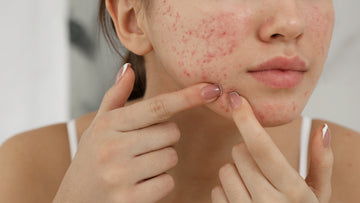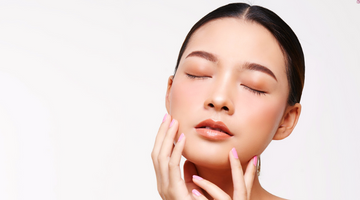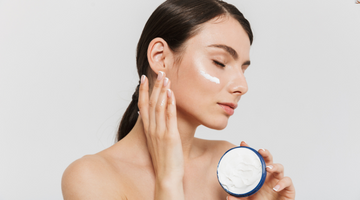Acne – oh, it's a word that brings back memories, right? So many of us have been there, dealing with those pesky breakouts popping up on our faces and sometimes even on our backs, chests, and shoulders. It's like acne doesn't care about our big day or that important selfie moment!
But why does acne even happen? Well, this article is about getting down to the nitty-gritty of acne and, more importantly, how to deal with it.
Understanding Acne
Acne occurs when the pores of your skin become blocked with oil, dead skin, or bacteria. Each pore on your skin opens a follicle, which contains hair and an oil gland. The oil gland helps remove old skin cells and keeps your skin soft.
When these glands produce too much oil, the pores can get blocked, accumulating dirt, debris, and bacteria. The blockage is called a plug.
The Main Causes of Acne
Excess Oil Production
The overproduction of oil (sebum) by the sebaceous glands in the skin is a common cause of acne. This excess oil can lead to clogged pores, providing a breeding ground for acne-causing bacteria.
Managing oil production is crucial, and using targeted treatments like the Zit Stop Acne Spot Corrector can be effective.
Dead Skin Cell Buildup
Accumulation of dead skin cells, when combined with excess oil, can block pores and set the stage for acne. Regular exfoliation and maintaining a balanced skincare routine are essential steps in preventing this buildup.
Bacteria
Propionibacterium acnes (P. acnes) is naturally present on the skin but can cause problems when it gets trapped in clogged pores. It multiplies rapidly, leading to inflammation and pimples.
Hormonal Changes
Hormones, particularly during puberty, can ramp up oil production, leading to acne. These hormonal fluctuations also occur during menstruation, pregnancy, and menopause.
Diet
Certain dietary factors, including dairy products and carbohydrate-rich foods like bread and chips, may trigger acne in some people.
Stress
While stress doesn’t directly cause acne, it exacerbates it by stimulating the production of hormones that increase oil production. During stressful times, maintaining a skincare regimen, including the use of products like Clear Drops Barrier Repair Acne Serum, can be beneficial in controlling breakouts.
Now that you know what triggers your nemesis, let’s understand how can you manage them.
Tips for Managing Acne
Gentle Cleansing
It's essential to clean your face twice daily with a mild cleanser. This helps remove excess oil and dirt that can clog pores and lead to acne. Choose a gentle, non-irritating cleanser that doesn't strip your skin of its natural oils.
Avoid Over-Exfoliating
While exfoliation is important for removing dead skin cells, overdoing it can irritate your skin and worsen acne. Stick to gentle exfoliation and limit exfoliating to once or twice a week.
Don't Pick or Squeeze Pimples
It's tempting to pick or squeeze pimples, which can cause scarring and infections. Instead, use a spot treatment and let pimples heal naturally.
You can try Within Beauty Acne Spot Corrector which reduces breakouts and heals the skin barrier.
Use Non-Comedogenic Products
When selecting makeup and skincare products, look for those labeled non-comedogenic. These products are formulated not to clog pores, reducing the risk of developing acne.
Watch Your Diet
Your diet can impact your skin. Pay attention to how your skin reacts to certain foods. Foods high in sugar and dairy are known to trigger acne in some people.
Manage Stress
High-stress levels can worsen acne. Engage in activities that reduce stress, such as yoga, meditation, or regular exercise. These practices help manage stress and improve your overall skin health.
Final Thoughts
Acne is a complex condition influenced by various factors, including oil production, dead skin cells, bacteria, hormones, diet, and stress.
Understanding these factors is key to managing acne effectively. Along with this, opting for skincare products focused on acne treatment can accelerate your acne healing process. You incorporate Within Beauty’s Acne Spot Corrector and Acne Gel in your skincare regime for better results.
Remember, every skin is unique, so it's important to find a routine that works for you and be patient; skincare is a journey, not a race. With the right approach and products, achieving clearer, healthier skin is within reach.






